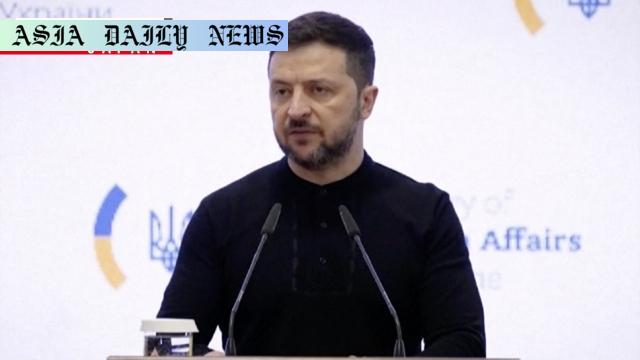Ukraine requires at least 200,000 European troops for peacekeeping after ceasefire deal with Russia, says President Zelenskyy.
Ukrainian President Zelenskyy calls for 200,000 peacekeepers after a potential ceasefire with Russia.
Zelenskyy emphasizes the troop deployment to deter any future Russian aggression.
200,000 peacekeepers equate to the size of France’s entire armed forces.

Zelenskyy’s Appeal for Peacekeepers
Ukrainian President Volodymyr Zelenskyy has taken a firm stance on Ukraine’s need for peacekeeping forces in the event of a ceasefire agreement with Russia. Speaking at the World Economic Forum in Switzerland, Zelenskyy underscored the necessity of deploying at least 200,000 peacekeepers from European nations. According to the President, this number is critical to maintaining Ukraine’s security and standing up to potential renewed aggression by Russia.
Why 200,000 Peacekeepers?
President Zelenskyy highlighted that the 200,000 troops would act as a baseline requirement to create a stable environment. This number is significant in contrast to Ukraine’s current military force of approximately 800,000 and Russia’s capacity to mobilize up to 1.5 million soldiers. “Otherwise, it’s nothing,” Zelenskyy remarked, emphasizing that fewer troops would not suffice in counterbalancing Russia’s military strength.
Broader Implications for Europe and NATO
The deployment of 200,000 peacekeepers raises logistical and geopolitical questions. To put the scale in context, the requested number of peacekeepers is comparable to the entirety of France’s armed forces. Zelenskyy has previously suggested involving foreign troops in Ukraine before the nation achieves NATO membership, provided there is a tangible roadmap for its inclusion in the alliance. This proposal reflects Ukraine’s increasing reliance on international assistance to counter Russia’s sustained military threat.
Meeting with US Leadership
While focused on European peacekeeping forces, Zelenskyy also noted preparations for a future meeting with US President Donald Trump. Although details remain pending, the dialogue could further fortify Ukraine’s ties with the United States and highlight mutual interests in resisting Russian aggression. Zelenskyy has consistently emphasized Ukraine’s position as a strategic ally amidst evolving global tensions.
Challenges to Implementation
While Zelenskyy’s call is ambitious, it doesn’t come without hurdles. The logistics of coordinating a force of this size and garnering support from European nations are monumental tasks. Additionally, with such a deployment requiring unanimous international cooperation, the political climate and future peace agreements will play a pivotal role in seeing this initiative through. Nations contributing peacekeepers must navigate the risks of direct engagement and potential escalations with Russia.
The Global Significance
Ukraine’s request for peacekeepers reflects the broader challenges of global security in the 21st century. It also highlights the vulnerability of smaller nations facing aggressive neighbors. Zelenskyy’s pragmatic approach serves as a call to action, urging European nations to actively safeguard democratic values and regional stability while preventing the re-emergence of large-scale conflicts in Eastern Europe.
Conclusion
President Zelenskyy’s proposal underscores the dire threats posed by ongoing aggression and the effort required to ensure peace and stability in the region. His assessment is a stark reminder of the imbalance of power and the critical need for international collaboration. Regardless of the challenges, Zelenskyy’s call serves as a beacon of hope, aimed at securing a better future for Ukraine and its allies alike.



Commentary
A Bold Call for Global Collaboration
President Zelenskyy’s request for 200,000 peacekeepers sends a powerful and unambiguous message: International cooperation is indispensable in Ukraine’s fight for sovereignty and stability. By appealing to Europe, Zelenskyy is not only acknowledging Ukraine’s limitations but also highlighting a broader responsibility shared by neighboring nations to support a country under siege. His remarks at the World Economic Forum resonated with urgency and resolve, calling for proactive measures rather than reactive responses.
Sustainability of Peace through Strong Measures
The idea of deploying such a substantial force underscores the gravity of Ukraine’s situation and its ongoing vulnerabilities. The sheer number—200,000—might seem overwhelming, but it emphasizes a realistic view of the risks posed by a powerful adversary. Zelenskyy’s assertions push the international community to reflect on its collective strength and responsibility, especially when peace and democracy are at stake in Europe.
Challenges Demand Courageous Leadership
Although the task ahead is daunting, Zelenskyy’s proposal carves a path forward that champions the values of unity and resilience. His leadership reflects determination, pragmatism, and a genuine desire to protect his nation. For European and NATO leaders, this serves as a wake-up call ensuring that inaction is not an option. Collaborative security efforts will determine not only Ukraine’s future but also the stability of the broader region.